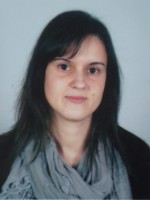abstract
Ionic liquids have attracted a large amount of interest in the past few years. One approach to better understand their peculiar nature and characteristics is through the analysis of their surface properties. Some research has provided novel information on the organization of pure ionic liquids at the vapor-liquid interface; yet, a systematic study on the surface properties of mixtures of ionic liquids and their organization at the surface has not previously been carried out in the literature. This work reports, for the first time, a comprehensive analysis of the surface organization of mixtures of ionic liquids constituted by 1-alkyl-3-methyl-imidazolium bis(trifluoromethylsulfonyl)imide ionic liquids, [C(n)mim]-[NTf2]. The surface tension of mixtures composed of [C(4)mim][NTf2] + [C(n)mim][NTf2] (n = 1, 2, 5, 6, 8, and 10) was experimentally determined, at 298.2 K and atmospheric pressure, in the whole composition range. From the experimental data, the surface tension deviations and the relative Gibbs adsorption isotherms were estimated showing how the surface composition of an ionic liquid mixture differs from that of the liquid bulk and that the surface is enriched by the ionic liquid with the longest alkyl chain length. Finally, the soft-SAFT equation of state coupled with the density gradient theory (DGT) was used, for the first time, to successfully reproduce the surface tension experimental data of binary mixtures of ionic liquids using a molecular-based approach. In addition, the DGT was used to compute the density profiles of the two components across the interface, confirming the experimental results for the components distribution at the bulk and at the vapor liquid interface.
keywords
EQUATION-OF-STATE; DIRECTIONAL ATTRACTIVE FORCES; LENNARD-JONES CHAINS; PHASE-EQUILIBRIA; COMMON ION; TEMPERATURE; SIMULATION; BEHAVIOR; ANION; INTERFACES
subject category
Chemistry
authors
Oliveira, MB; Dominguez-Perez, M; Freire, MG; Llovell, F; Cabeza, O; Lopes-da-Silva, JA; Vega, LF; Coutinho, JAP
our authors
Groups
G4 - Renewable Materials and Circular Economy
G5 - Biomimetic, Biological and Living Materials
acknowledgements
The authors acknowledge the financial support from Fundacao para a Ciencia e a Tecnologia (FCT) for Projects PTDC/EQU-FTT/102166/2008 and Pest-C/CTM/LA0011/2011. M.B.O. and M.G.F. also acknowledge FCT for the postdoctoral Grants SFRH/BPD/71200/2010 and SFRH/BPD/41781/2007. F.L. acknowledges the Catalan Government for a TALENT contract. O.C. and M.D.-P. acknowledge the funding of Xunta de Galicia through the research project of reference 10-PXI-103-294 PR. Additional financial support was provided by the Spanish government, Ministerio de Economia y Competitividad (CENIT SOST-CO2 CEN2008-01027) and the Catalan government (Project 2009SGR-666). Support from Carburos Metalicos, Air Products Group, is also acknowledged.




